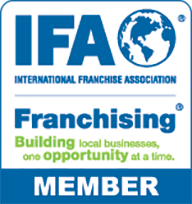Intro to Franchise Business Agreements and Renewals
A franchise business agreement (often just called a franchise agreement) is the contract between a franchisor and a franchisee that outlines the relationship between the two parties and what is expected from each party to make the relationship work.
All franchise agreements should be read in full (yes, they’re tedious and full of weird language that seems like it’s doing backflips, but they’re important) and they should all be given to an attorney (preferably one that specializes in franchising) to look over, as well.
Each franchise agreement is different and uses slightly different language, but there are several elements they virtually all share.
Agreements with major franchises are usually non-negotiable.
Chances are, if a franchise is well-known enough to be a household name, the franchise agreement will not be negotiable. That franchise got to the size it is by having a system that works and everyone who joins is expected to use that system. A major franchise will have no problems attracting franchisees, so anyone who is not willing to sign the agreement as is, will likely just be passed over.
If a franchise is willing to negotiate important parts of its franchise agreement, that should raise some red flags.
Counterintuitive, yes, but this makes sense if you think about it. A franchise that is willing to negotiate its agreement may not be confident in its own system and the strength of its own brand. Franchises that are just getting started may be more willing to negotiate their agreements, but if they are a little too willing, proceed carefully.
Franchise agreements are meant to protect the brand as a whole.
A franchise agreement will be written from the point of view of the company and it will be written in a way that is meant to protect the franchising company, the integrity of the franchise’s operating system and the brand as a whole. You may not appreciate this when you’re on the outside looking in, but once you’re a part of that brand family, you may change your mind. Think about how much damage a few poorly run locations could do to the brand as a whole.
All the things you must do and cannot do will be clearly spelled out.
These are essentially the rules you have to follow if you want to run one of these franchise locations. The company will have a set of standards that you have to follow, as well as a list of things you must never do. These rules are not arbitrary. The franchise believes they know how best to run and protect their system and their brand and these rules reflect that.
Franchise agreements have an end date.
When you enter into a franchise agreement, you are essentially leasing the right to use the brand and the system of the franchise. This lease could last anywhere from five years to 20 years and will likely correspond to the amount that you invest. So, if you have to invest $100,000 in the franchise business, your agreement will be shorter than if you have to invest $1 million.
When your agreement does come to an end, you will have the opportunity to renew it, providing that you are in good standing with the franchise and you pay the renewal fee. You and your staff may have to update your training, you may have to update your equipment and location to reflect the franchise’s current standards and you will have to sign another franchising agreement, which may or may not be significantly different from the original one. As with the original, you should read it in full and have your attorney look it over.
If you joined a new franchise and you’re renewing, the financials may have changed, such as the royalties you owe the franchisor, but in established franchises, the financials typically stay the same. You will need to give ample notice to your franchisor that you want to renew your agreement. This will typically be about six months prior to its expiration.
On the other hand, if you choose not to renew, you will then lose the right to use the franchise’s name, brand and operating system and your franchise may be transferred to someone else. In addition to that, many franchise agreements contain a non-compete clause, meaning you cannot open a business in the same industry to compete against the franchise you’ve just left. This is to prevent people from using the franchise as a “training ground” for running their own independent business.
For maximum financial gain, it would be a better option to renew your franchise agreement and then sell your franchise business.
When entering into a franchise agreement or renewing one, perform your due diligence, read it carefully and make sure you have an interpreter (lawyer) read it, too. Remember that while the agreement may look like it’s geared solely toward the company, the franchise is trying to protect the brand for the good of the overall franchise family. FranNet can help you find the perfect franchise to connect with. Sign up for a free FranNet franchise search and consultation today.





